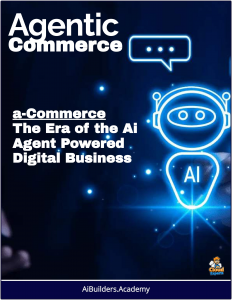 In the blink of a digital eye, e-commerce and customer service have transformed from static storefronts and scripted call center interactions to dynamic, intelligent ecosystems powered by Agentic AI.
In the blink of a digital eye, e-commerce and customer service have transformed from static storefronts and scripted call center interactions to dynamic, intelligent ecosystems powered by Agentic AI.
This book traces the remarkable evolution of these industries, from the early days of dial-up online stores and toll-free hotlines to an era where autonomous AI agents anticipate customer needs, personalize experiences at scale, and redefine operational efficiency.
As businesses navigate this paradigm shift, “From Carts to Conversations” explores the technological breakthroughs, economic impacts, and ethical considerations driving the future of commerce and customer engagement.
Through vivid case studies, expert insights, and forward-looking analysis, we uncover how Agentic AI is not just enhancing but revolutionizing how we buy, sell, and connect in an interconnected world. From global retail giants leveraging AI to predict purchasing trends to innovative call centers resolving complex queries in real time, this book illustrates the transformative power of intelligent systems.
Leadership Exemplars
In the feature video Visa Spotlight explores agentic commerce and how AI agents are revolutionizing the way we discover and purchase products and services. Their expert speakers discuss Visa Intelligent Commerce, a new program that enables agents and platforms to deliver seamless and secure shopping experiences.
Amazon’s Predictive Personalization Engine
Amazon, a pioneer in e-commerce, has integrated Agentic AI to enhance its recommendation algorithms, moving beyond traditional collaborative filtering to predictive models that anticipate customer needs. By analyzing real-time data—such as browsing history, cart activity, and even external factors like weather patterns—Amazon’s AI agents suggest products with uncanny precision.
For instance, during the 2023 holiday season, Amazon’s AI-driven “anticipatory shipping” system prepositioned inventory in warehouses based on predicted demand, reducing delivery times by 20% and boosting customer satisfaction scores. This case study examines how Amazon’s use of Agentic AI has set a new standard for personalized e-commerce at scale.
Zendesk’s AI-Powered Customer Support Revolution
Zendesk, a leader in customer service platforms, deployed Agentic AI to transform call center operations for a major telecom provider in 2024. By integrating autonomous AI agents capable of natural language understanding and contextual decision-making, the company reduced average call resolution times from 8 minutes to under 3 minutes.
These AI agents handled 70% of routine inquiries—such as billing questions and plan changes—while seamlessly escalating complex issues to human agents with full contextual handoffs. This case study highlights how Agentic AI enhances efficiency and customer satisfaction while reducing operational costs.
Shopify’s Virtual Storefront Assistants
Shopify empowered small and medium-sized businesses with Agentic AI through its 2025 launch of “Shopify Converse,” a suite of AI-driven virtual assistants. For example, a boutique fashion retailer in Europe used Shopify Converse to create personalized shopping experiences, with AI agents engaging customers via chat to recommend outfits based on style preferences and past purchases.
The retailer saw a 35% increase in conversion rates and a 15% reduction in cart abandonment. This case study showcases how Agentic AI democratizes advanced e-commerce tools, enabling smaller players to compete with industry giants.
T-Mobile’s Hybrid AI Call Center Model
In 2024, T-Mobile implemented an Agentic AI system to overhaul its customer service operations. The AI agents, trained on millions of past interactions, resolved routine technical issues—like network troubleshooting—in real time, while also predicting customer churn risk based on sentiment analysis.
For instance, when a customer expressed frustration over dropped calls, the AI proactively offered a discounted plan upgrade, reducing churn by 12% in a single quarter. This case study explores how Agentic AI blends automation with empathy, creating a hybrid model that enhances both efficiency and customer loyalty.
Through these examples and more, a-Commerce reveals the profound impact of Agentic AI, offering a roadmap for businesses to harness its potential while navigating the challenges of ethics, scalability, and human-AI collaboration in the evolving landscape of e-commerce and customer service.



